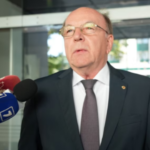In a context where the president frequently acts more as a lobbyist than as a representative of all citizens, the elements of an absolutist monarchy overshadow the principles of democracy, leading to severe consequences for society, as noted by the interlocutors. Despite his various roles—whether as the first deputy prime minister, prime minister, or president—Vucic’s signature is conspicuously absent from any of the advocated projects and policies.
Lobbying primarily involves exerting influence over legislative power to secure decisions that favor specific groups. It often pertains to legal matters and can encompass various targeted initiatives. Notable examples of lobbying include significant issues such as combating climate change or a nation’s foreign policy, including the complex relationships between Kosovo and Serbia, as well as European integration efforts.
The behavior of the Serbian president often resembles that of a lobbyist, despite not officially holding that role. The topics he engages with are diverse and typically extend beyond the scope of his official responsibilities. Key issues include the controversial developments in Belgrade, the dismantling of the General Staff, the Brussels Agreement, the Ohrid Agreement, the Expo, the construction of the national stadium and three additional stadiums in Serbia, the signing of a memorandum with the EU for cooperation in critical raw materials, and his increasingly fervent advocacy for the opening of lithium mines without an environmental impact assessment or a mining project plan. Furthermore, the president has consistently downplayed the effects of climate change and has offered various justifications for pollution.
In addition to the Brussels and Ohrid Agreements, the president’s other commitments primarily revolve around business projects rather than advocacy, such as policy initiatives, as reported by Paparaci. This indicates a shift in focus from traditional political engagement to a more business-oriented approach, which raises questions about the implications for governance and public accountability. The president’s actions suggest a prioritization of economic interests over political discourse, potentially altering the landscape of political engagement in the region.
The question arises regarding the boundaries between ambition and expertise, as some perceive President Vučić as a universal expert in all matters, blurring the lines between being a lobbyist and serving as the president for all citizens of Serbia. This perception is compounded by the notion that his influence dictates who ascends to positions of power, based on his personal judgments and preferences. In this context, the political environment operates under a principle where Vučić’s directives are followed without question, reflecting a system where authority is centralized and dissent is minimized.
Dragan Popović from the Center for Practical Politics argues that the Serbian president has systematically worked for years to establish a personal power structure, leading to a natural erosion of the distinction between public and private interests. This conflation allows for the easy utilization of public resources, including finances and institutions, for the benefit of his party or personal gain. In an authoritarian system, decisions that would typically emerge from democratic processes are instead dictated by the will of the autocrat, determining everything from infrastructure projects to employment, as evidenced by Vučić’s public directives to officials regarding various initiatives.
Angjellkoviq emphasizes that in such a situation, the obstacles to his behavior are not state institutions, but the citizens. He points out that Vucic is aware that he can do anything with bayonets, but cannot rely on them in the long run. Therefore, he uses threats, sporadic violence, and bribery for certain groups and individuals who are particularly needed at a specific moment, continuously using hypnotic black propaganda for the wider population.
Angjellkoviq states that in other words, he systematically and deliberately bursts lies and half-truths. When considering everything Vucic has done unconstitutionally or illegally so far in the direction of Serbia’s withdrawal from Kosovo and the implementation of the Belgrade Waterfront project, it is clear that we should talk about the darkest propaganda, not lobbying. The same goes for what Vucic is doing now regarding Rio Tinto or EXPO. All of these are his personal business combinations or giving tribute to world powers to let him rule quietly as a dictator in the heart of democratic Europe at the beginning of the 21st century.
Popoviq emphasizes that the consequences are dramatic, not only for democracy but also for the development of Serbia, as public resources are treated as private, decisions are made without any control, and there is no accountability.
Angjellkoviq argues that it is logical for someone who decides everything in an officially democratic but practically undemocratic system to pass the responsibility to the people he has chosen to be his executors, or for everything to be done based on verbal orders and statements, without proper documentation. He also states that Vuçiqi, as a lawyer, knows very well that what he has done in relation to Kosovo, from the perspective of the Serbian Constitution, constitutes high treason.
“He is aware that when it comes to what has been done in relation to Belgrade on the Water and what is happening in relation to the creation of the lithium empire of the company Rio Tinto in Serbia, the worst systematic abuses are involved. He is not foolish to take it upon himself. He certainly adheres to the formula that those who take a piece of the pie according to his decision should take all the risk upon themselves,” says Angjellkoviq.
According to Angjellkoviq, such a construction will fall apart when the current regime falls, but for years it has helped Vuçiqi to prolong it. “He may hope to leave Serbia when he sees that the changes have become inevitable, meaning that somewhere far from this country, they will protect him from responsibility – those with whom he is now making various combinations in his own interest and theirs with black propaganda and other antidemocratic methods are pushing him to do what is bad for Serbia,” Angjellkoviq concluded.







